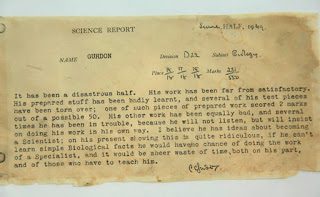Juxtaposed News Headlines
This week there are two news stories that seem to be bumping up against each other. If these two news items don’t present a serious call to action, then at the very least they should be thought provoking for parents, teachers and physicians. Consider each of these headlines:
- A Nobel prize winner, his dreadful school report and a lesson for teachers today (The Daily Mail – October 9, 2012)
- Attention Disorder or Not, Pills to Help in School (The New York Times – October 9, 2012)
Hopefully you have a few minutes to read these articles. Let’s see what we can learn from each.
Meet Sir John Gurdon
This week the Cambridge scientist Sir John Gurdon was awarded the Nobel Prize in Physiology or Medicine. Sir Gurdon is now 79 years old and is particularly known for his work in the field of cloning and cell research. However, he shares more in common with Albert Einstein than his love of science. Interestingly, at a very young age, both Gurdon and Einstein were cautioned by their science teachers that they would never succeed in the field of science! If you find this hard to believe Sir Gurdon saved his report card from 1949.
 |
||
| Sir Gurdon’s Science Report 1949, Photo by the Associated Press (click to enlarge) |
If you enlarge the photo by clicking on it, you will see the science teacher says, among other things: “…several times he has been in trouble, because he will not listen, but will insist on doing his work his own way.” Perhaps a parent or teacher in the year 2012 would suspect that John Gurdon suffered from attention-deficit/hyperactivity disorder (ADHD) and the next step would be to subscribe a stimulant like Adderall to help modify the child’s behavior. The Daily Mail article referenced above suggests that perhaps it was this stinging report that challenged Gurdon to do better, to work harder. After all, it seems Gurdon’s science teacher felt he had to be honest about Gurdon’s behavior, as opposed to congratulating Gurdon for simply showing up. The Daily Mail goes on to say:
“The truth is that in state schools, proper school reports are a thing of the past. The old cliche — ‘could do better’ — is no longer allowed. It’s considered too harsh for the poor dears. But the fact is that unless someone tells a young pupil that they could do better, they never will do better. They are left with the lie that they could not improve — even if they tried.”
Meet Dr. Michael Anderson
The New York Times article referenced above profiles the medical practice of Dr. Michael Anderson, particularly his willingness to prescribe Adderall or another psychotropic medication to improve a child’s academic performance, even when the child does not meet the guidelines for an ADHD diagnosis. The New York Times quotes Dr. Anderson:
“We’ve decided as a society that it’s too expensive to modify the kid’s environment. So we have to modify the kid.”
Many experts in this field, while not condoning Anderson’s actions, do believe that wealthy students abuse such stimulants to improve their grades in high school and college, now physicians are willing to prescribe such drugs to low-income students to see them succeed in school as well. Interestingly, if a student has a diagnosis of ADHD they are eligible for accommodations on the College Board tests (extended timed testing or use of a computer). It should be noted that Dr. Anderson is a pediatrician in Cherokee County, north of Atlanta, and many of his families are poor.
Some stats about ADHD and stimulant drugs…
- The diagnosis of ADHD is increasing among American youth.
- 9.5% of Americans 4 -17 years old (5.4 million) were diagnosed with ADHD in 2007.
- The DEA classifies these stimulants as Schedule II Controlled Substances, they are addictive.
- The long term effects of these stimulants are not completely understood, particularly as to how they may affect the brain that is still developing.
- Children prescribed these drugs at a very young age may become dependent on them and continue to use them well into adulthood.
- A 2010 study published by the Journal of Attention Disorders suggested that minimally 20% of doctors do not follow the diagnosis protocol for ADHD.
Parenting in 2012
We often post about the challenges of being a parent. Today we are hopeful that after reading the two articles that we’ve discussed, parents will give some thought about the efficacy of medicating their children for a disorder that may not be present. We all want our children to be able to compete on a level playing field and to mature healthfully, but by not checking out alternatives to an unwarranted ADHD diagnosis, like counseling, mentoring, family therapy, tutoring, Big Brothers/Big Sisters, or Boys & Girls Clubs of America, we might be setting our children up for dependence on a controlled substance.
Take some time, slow down a bit, relax and try to remember how your parents and teachers encouraged you to do your best. There is an old nursery rhyme: “Good, Better, Best. Never let it rest / Until your Good is Better, and your Better is your Best.” Do you remember it? Maybe we can all practice it!







